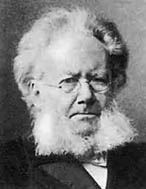Henrik Ibsen's psychodramas still grip the world 100 years after his death
The main character in Henrik Ibsen's 1892 play "The Master Builder" exclaims: "The younger generation will come knocking at my door."

One hundred years after his death, new generations are doing just that, in ways he could never have imagined.
To commemorate Tuesday's anniversary, the work of the Norwegian dramatist is being performed by rap artists, ballet dancers, Chinese opera singers and robots. His plays are being staged in front of the Sphinx in Egypt and at universities in Bangladesh. A conference on his work is being held in Mexico City. Romania is commemorating him on stamps.
There are 8,000 events worldwide marking what Norway has declared "The Year of Ibsen," in honor of one of the most influential playwrights of modern theater who died at age 78 on May 23, 1906.
"This year, Ibsen will be performed more than Shakespeare," said Bentein Baardson, a theater director and head of the Ibsen 2006 celebrations.
Baardson told The Associated Press interest was so intense that the number of events worldwide had doubled from the original plan.
Ibsen wrote 26 plays, including "A Doll's House," "Peer Gynt," "The Wild Duck" and "Hedda Gabler." Baardson said "A Doll's House" is the world's most performed play.
Ibsen's works, especially his realistic dramas in which he rebelled against social conventions, examine such themes as venereal disease, alcoholism, incest and insanity, all shocking and forbidden subjects in his era that remain topical today.
"He was a reformer of society," Baardson said. "For him, the themes were universal. Everything he wrote is about fundamental human rights, gender equality, free expression, business morals and so on."
Frode Helland, director of the Ibsen Center in Oslo, agreed.
"The problems Ibsen analyzes in his plays are the problems we still face today. They are about privacy and public life, finances and the impact on private lives, the relationships between the sexes."
When Sigmund Freud, the Austrian father of psychoanalysis, was just 9 years old, Ibsen was already exploring the human psyche in plays later described as psychoanalysis in dramatic form.
Baardson said Freud learned to read Norwegian so he could study Ibsen, and once proclaimed the writer to be the most important influence on modern thinking.
Such is his fame that when New York City park officials recently released a wild turkey into Manhattan's Morningside Park, they named it Hedda Gobbler, after "Hedda Gabler," a character in Ibsen's 1890 play.
In March, also in New York, the Les Freres Corbusier theater group produced "Heddatron" a farce inspired by "Hedda Gabler" whose stars include actors Ibsen could hardly have imagined: robots.
Like Freud, American actor Earl Hyman, known for his role as Grandfather Huxtable on the Bill Cosby show in the United States, learned Norwegian so he could read Ibsen's plays. Hyman became so adept at the Nordic language he has even performed Ibsen in Norwegian in Norway.
The playwright was born Henrik Johan Ibsen on March 20, 1828, in the southern town of Skien, to the merchant Knud Ibsen and his wife Marichen.
When Ibsen was about 7, his father went bankrupt, forcing the family to sell everything and move to a farm near the village of Gjerpen.
The rural, and transparent, life of small towns is said to have been a key in Ibsen developing an eye for the conventions and traditions used by society to control behavior.
As a teenager, he reluctantly served as an apprentice to a pharmacist, and had an illegitimate child with one of the pharmacist's servants.
His first play to be staged, the one-act "The Burial Mound," opened on Sept. 26, 1850, in Oslo to cool reviews. So many of his early plays were ignored or panned that Ibsen in 1864 fled to Italy, then Germany, for 27 years of self-imposed exile.
Many experts say Ibsen did not especially like Norway, but that to understand his work one must also grasp the nation's severe beauty, isolation and reserved people.
"That is why they become introspective and serious," Ibsen wrote, "they brood and doubt and they often lose faith. At home every other person is a philosopher! There, the long, dark, winters come with their thick fogs enveloping the houses oh, how they long for the sun!", reports AP.
O.Ch.
Subscribe to Pravda.Ru Telegram channel, Facebook, RSS!


